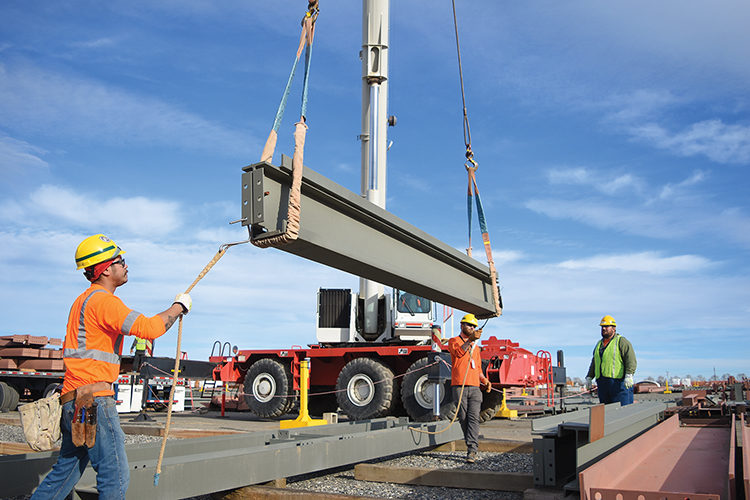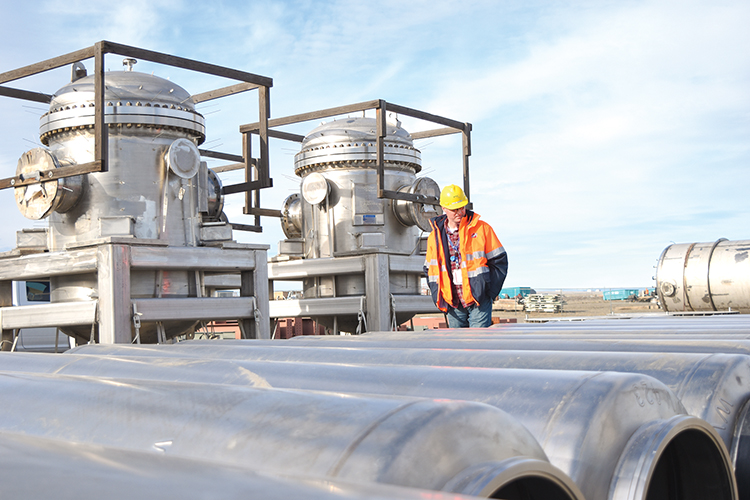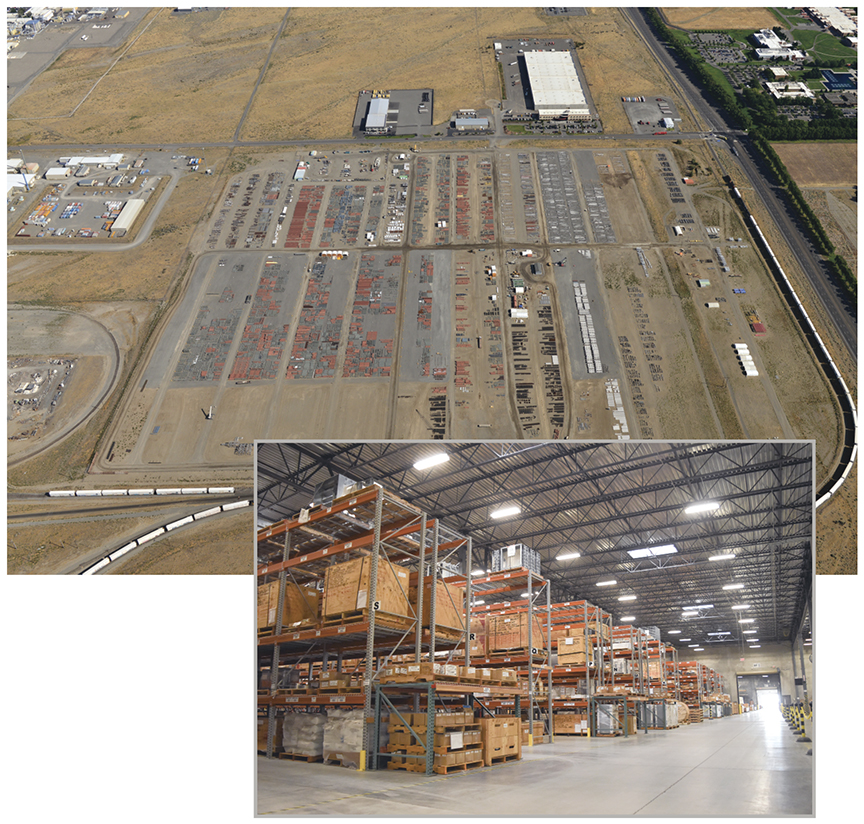
Home » Behind-the-scene workers manage massive warehouses
Behind-the-scene workers manage massive warehouses

April 15, 2020
By Ian Klei
Bechtel National Inc.
They may operate in the background but the employees at the Waste Treatment and Immobilization Plant’s Material Handling Facility (MHF) warehouse play an important role in the mission to treat Hanford’s tank waste.

The team receives, inspects, stores and delivers all materials and equipment needed to build the Hanford vit plant, which is part of the U.S. Department of Energy’s (DOE) Direct-Feed Low-Activity Waste (DFLAW) program.
Their skill, precision and ingenuity in accomplishing these tasks support the progress being made by their counterparts at the job site. They take pride in what they do and they do it well.
Bechtel National Inc. holds the contract to design, build, startup and commission the vit plant.
The MHF team works with electricians, ironworkers, laborers, operators, pipefitters and teamsters. As a whole, they ensure material arriving at the warehouse is properly received, inspected, stored and maintained until needed for installation.
“I consider the MHF warehouse to be world class,” said Ron Sudduth, supplier quality and materials management manager at MHF. “It gives me great pride when our customers walk through and say ‘wow.’ This warehouse is the best I have ever seen and our process is as good, if not better, than any in the industry.”
The process includes non-manual employees from material management, receiving inspection and testing, asset management, traffic and logistics who collaborate to ensure material arriving at the warehouse is properly received, inspected, stored and maintained until needed for installation.
“The material handling facility team represents important capabilities that have been supporting the DFLAW construction and treatment program and are integral to our drive to make glass by 2023,” said Wahed Abdul, federal project director for DOE’s Office of Environmental Management.
Effective collaboration across so many disciplines is the key to success for this crew that filled more than 4,200 requests for materials in 2019 with a 99.5 percent on-time rate. Delays at the warehouse would mean a potentially negative impact on progress because work is planned and job site activities are scheduled to complete construction and startup and begin treating tank waste.
“When we say we have something, we have it,” Sudduth said. “We do our job right the first time, which saves time and money. We are not losing time looking for material, and we are not losing money rebuying commodities.”
Collaboration doesn’t end within the walls of the warehouse.
When a request is made from the field, the MHF employees load the needed materials or equipment onto trucks and deliver them to the job site.
This process involves logistical planning and coordination with field engineering, security and construction.
Loading material often involves the use of heavy equipment. Larger items can even require working with an external shipping company and closing roads. Employees on the other end need to be ready to receive. And safety and quality are built into all processes.
“Often times the material or equipment being moved is large, important, and very expensive,” Sudduth said. “The integrity of the item and the safety of the workers have to be assured. We can’t afford to make mistakes.”
When not receiving materials and fulfilling job site requests, MHF staff ensures the stored materials are marked and tagged appropriately to maintain accountability and keeps them clean, free of damage, and ready for use.
There are more than 800,000 items being stored with a value of nearly $200 million, and more than 3 million pieces of material have been moved through the warehouse by MHF workers.
This much material requires massive amounts of space.

The 240,000-square-foot warehouse – about 20 miles from the job site in north Richland – is the main hub of material management. Items are received and unloaded or loaded for delivery there.
Material considered “hot” that will need to be shipped to the job site soon, as well as those that need periodic maintenance or inspection, are stored at MHF.
Located just south of the warehouse is 127 acres of outdoor storage, dubbed the South 40.
Items stored here must be able to withstand exposure to the elements of a desert landscape. Employees constantly maintain the items by cleaning off blown dirt and tumbleweeds, eradicating weeds and protecting equipment from wildlife looking for a home. It’s not uncommon to encounter rattlesnakes, jackrabbits, coyotes or deer, as well as bugs and bees.
Another storage warehouse is 80 miles away in Yakima. This 150,000-square-foot unmanned warehouse contains material that will be stored for longer without need for maintenance or inspections.
DOE regulations require that every piece of material is tracked and accounted for from the supplier all the way to installation.
Helping to make sense of it all is Ryan McKee, superintendent of the crew of roughly 50 employees at MHF.
“We receive, inspect, track, store and maintain everything in meticulous detail,” McKee said. “If something isn’t correct, it needs to be remedied. If we order 100 screws and receive only 99, we can’t just call it good. We do the paperwork to get that one extra screw. We are accountable to DOE and the American taxpayer.”
The process is robust and can require extra time to complete tasks, but McKee acknowledges that following the procedures and plans are what ensures the plant is built to the quality and safety standards that befit a nuclear facility.
“We are a line of defense in the construction of the plant. Our job requires receiving and inspecting material that must be of the highest quality. If we allow something in the door that doesn’t meet those standards, it can have huge implications to the cost and schedule and the eventual safe operation of the plant. We don’t take that lightly,” McKee said.
Timbre Howard is an MHF heavy equipment operator, transporting materials and equipment on and off the truck and around the facilities and storage areas.
Her grandfather worked on several of the dams along the Columbia River and she takes pride in her turn to contribute to the long-term benefit of the area.
“Without the work we do at MHF, the plant wouldn’t get done,” Howard said. “We are all part of one team here with the same goal of treating the waste and protecting our home. I want my family to be proud of me the way I am proud of my grandpa.”
Sudduth believes that employee pride, coupled with the plan in place, is what makes the difference in their work.
“Bechtel came in and made a plan and set it up right,” he said. “The managers believe in it, they set the expectations, and then they help the employees achieve it. That is what makes us successful here at MHF, and that is the mindset across the project that is going to finish this mission.”
Ian Klei is a communications specialist for Bechtel National Inc.
Hanford
KEYWORDS april 2020





